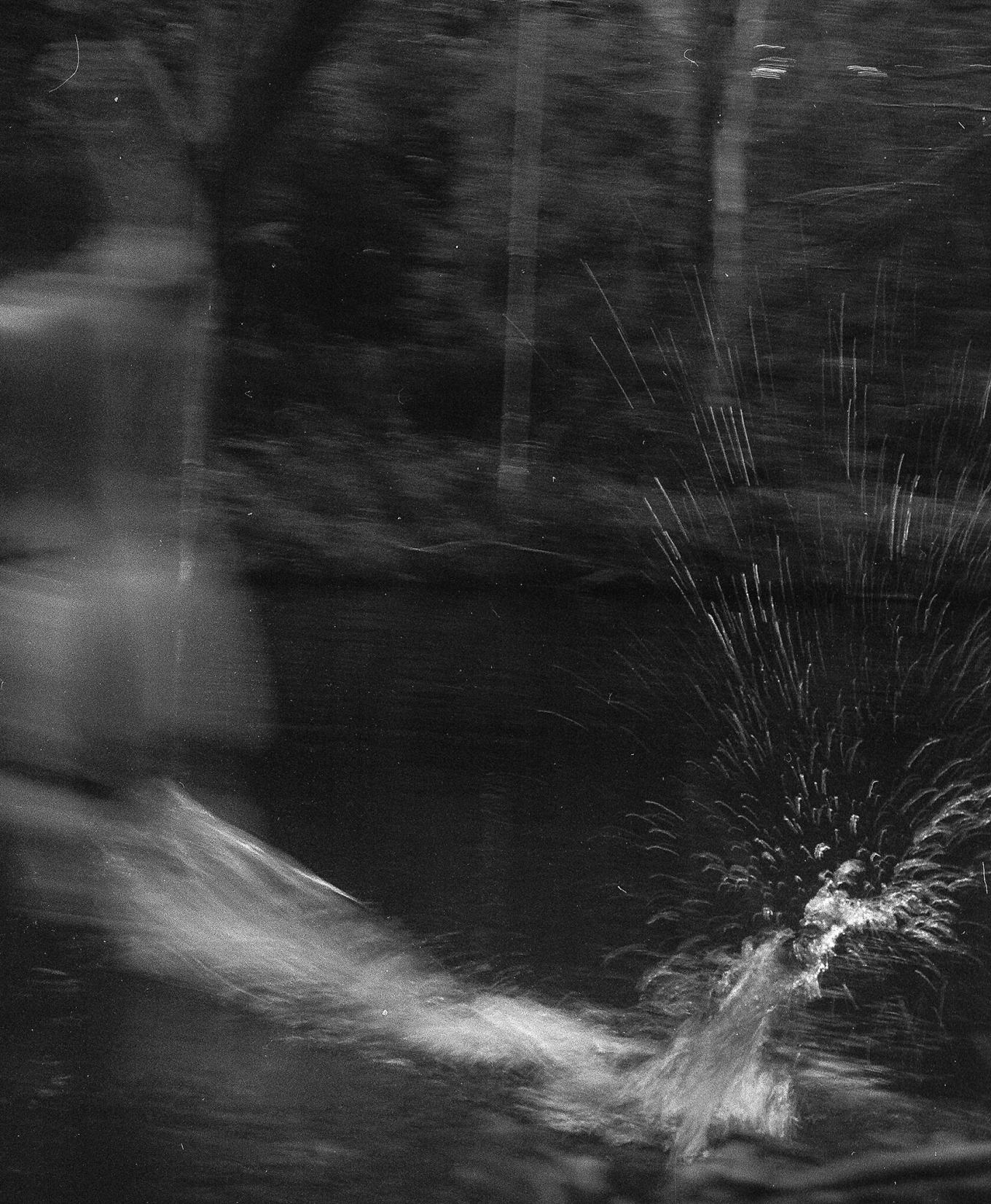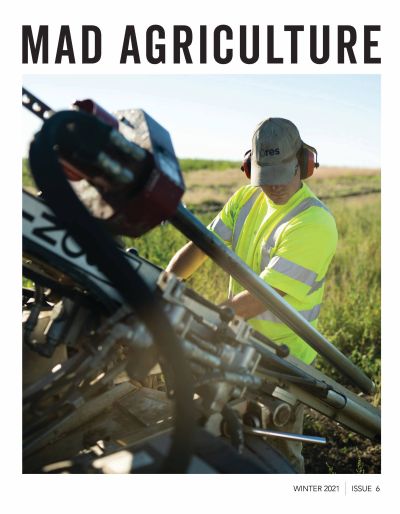
The Mad Agriculture Journal
The Flood. Deluge.
Published on
November 12, 2021
Written by
Emma Lietz Bilecky
Photos by
Jordan Perkins
Last night the remnants of Hurricane Ida moved through this place. We didn’t expect it to be so bad. It was my 29th birthday, and we were celebrating at the farm. First, dark skies in the early afternoon. Then, heavy rains. Later, a tornado warning (though it didn’t stop the pizza delivery). Soon enough, after the weather kept jolting all the cell phones awake, we had established a ritual: the alarms became queues for birthday wishes, even as they foreshadowed peril.
Had I known what would unfold hours later, I would have been rushing to pick what would too soon become the last produce from the farm of the season. Preserving the bounty for which we had all worked so hard for the dark time ahead. Remembering the taste of ground cherries and cherry tomatoes. Savoring moments with those fresh new chicks under heat lamps in the barn. The damage was catastrophic, toppling trees and power lines. Roads were closed, cratered, and traffic backed up for hours— with more deaths in this densely populated, car-covered state than anywhere else. By morning, the sky was calm and the sun was shining over the farm-turned-lake. White egrets, a symbol not yet of hope, foraged where Adirondack chairs began their journey downstream.
We can no longer eat from this land: all the vegetables the flood waters touched are contaminated with an unseemly stew of sewage, petrochemicals, manure, and heavy metals. Our Stony Brook swelled to become continuous with the farm, reaching toward the outer limits of its fluid border. The waters of chaos submerged all, suffocating the flightless.
What did it feel like for Noah, separated from the land by the great flood—all memory and meaning submerged beneath murky waters? An eerie quiet, disturbed peace the following day, through the echoes of the violence the waters wreaked. This is my first climate disaster. Though I comprehended before, and continuously, climate change as an existential threat, I am now processing this truth in my body—in my bones. Already the work of a farmer is an existential task—with minimal mediation between work and bread. Food begets labor, labor food, and so on.
For those of us raised in the West under the tyranny of the American Dream, to be in such close proximity to the work of our hands and the source of our bread might breed an acute sense of vulnerability, more so in a climate of accelerating disasters. Recent generations, obsessed with a sham security, call farmers traveling unconventional paths backwards. Though my grandfather worked tirelessly to distance himself from the dirt, this is where I must remain. Despite its precarity—perhaps because of it—this work, this food I daily deliver from the ground holds infinite value. From whence I know my life depends, I honor, I love, all the more intensely.
So when, after the soil which feeds me daily was inundated and its produce destroyed, I was asked how I was doing otherwise, I replied, “there is no otherwise.” This is what it feels like to be living in a time of ecological unraveling. I cannot conceptually separate how I am from how the land is—we are one in the same. Without the land of my labor and love, I am a logical inconsistency.

The work of our hands: in many ways, is us. We become the places we are—not only in decomposition, but before then, too, in the soils we build. Loving our places, we make them. The impressions we leave are mutual. No landscape is “natural”— untouched by humans, but all embed and reflect the desires of their caretakers. While true everywhere, many see this in earnest in agriculture. Memory, cognition, our self-concepts, too, trace these landscapes—places evoke pieces of us we forget, familiar motions insist on identities.
It’s hard for me to describe how attached I am to this plot of land—it is a relationship not merely transactional, but intimate. There were moments of frustration, fights we had, and moments of unspeakable joy. There were times my actions were careless and left scars. Other times, this land was my deepest consolation, shepherding me through processes of growth, learning, and grief.
I am disoriented, unmoored, now that I cannot eat from this land. The farm had, for a brief moment, become continuous with its immediate environment, no longer an oasis of organic biodiversity. Before, it seemed a haven from this state’s ceaseless transit, a clearing in the trees where my company were herons, hawks, and eagles circling overhead, toads and spiders my fingers brushed in harvesting, always surprising me with the reminder that I am never alone. When the flood came, this place became one with every other place, all covered by the same murky water. I am reminded that we are never isolated, we cannot insulate ourselves from consequences of our lives nor our collectivity.
My body had become one with this soil—watered by my sweat, even as its fruits daily replenished my waters. Its taste so familiar, its magic had become commonplace. I had, admittedly, complained of the work, the weeds, the heat too frequently. There were weeks the produce from the garden was so abundant it overwhelmed – days my feet were so tired I could not stand in the kitchen long enough to prepare the food I had grown. Now, after the season has ground to a halt, I wish I had enjoyed more slowly and more fully the taste of those tomatoes that stained my hands, shared more food while it was still gushing generously. I am not the same self without these plants, my companions, that make me daily, seasonally, continuously.
Though these climate disasters require the work of the farmer to be all the more skilled, they do not deter me. In fact, the threat of loss, mortality’s growing proximity in these rising waters, only intensifies my love for this land. Easy to see, now—those endless connections fusing land and city, climate and soil, collective action and its reverberation through touching bodies. Were we to run from this reality, it’s gravity would draw us back anyway. We go on, then, for burning love of life and craving food. We find new ways from no way—as those who know those other existential threats—capitalism, colonialism (in reality the same)—always have. (1) So long as we remain close to the land, its shocks will shake us, too. How can we go back to some fiction of normal, in this wake?
Money is a hollow substitute for a living. Granaries approximate coffers, but food, steeped in sunshine and aroma already on its way to rot finds its value in the outer extent of enjoyment one might possibly experience in every fleeting moment of its ripening. These plants are neither products nor instruments in profit’s production (to describe them as such is a necessary simplification, but one that misses too much). These plants with whom we live, who live through us, are friends with whom we exist in relations of mutual care, for the sake of survival alone. A constant reminder of our mortality, to eat is to know dependence. Eating has no other purpose—but is the meaning of life itself, already life’s eternality. How humbling this is for those of us raised to excel and achieve—that all our work is only, in the end, undertaken to enjoy food together, to taste and love life as much as we possibly can, and to share all of it. (2)
“Take this bread” – bread, which embeds the labor of so many – the soil and microbes, the hands of millers and bakers all before it reaches the table. I remember countless scenes of shared work, weeding, sowing, preparing. Every inch of the farm, even in flux, seared in my memory.
“This is my body.” In eating, we become bread, too. We become, once again, the land from which we were never separate. We are mud people, food for the soil and the soil, our food. This is our ongoingness. Every act of eating, a Eucharist, sutures us to the Divine. This work is never finished.
“We are in the world and of the world,” and constantly remade by it. (3) Its aberrance is, ultimately, our own.
This is what it looks like to live in the future – continuing, despite vulnerability to loss. From this change, we cannot insulate ourselves, nor survive apart from it. Alone we are fragile, together, only as strong as the relations that sustain us.
1 See Leanne Betasamosake Simpson, As We Have Always Done: Indigenous Freedom through Radical Resistance (Minneapolis: University of Minnesota Press, 2021) and Kyle Whyte, “Our Ancestors’ Dystopia Now: Indigenous Conservation and the Anthropocene,” in The Routledge Companion to the Environmental Humanities, 2017, 222
2 I attribute this insight to Chris Newman of Sylvanaqua Farms, with gratitude.
3 María Puig de la Bellacasa, Matters of Care: Speculative Ethics in More than Human Worlds, 3rd ed. edition (Minneapolis: Univ Of Minnesota Press, 2017).
